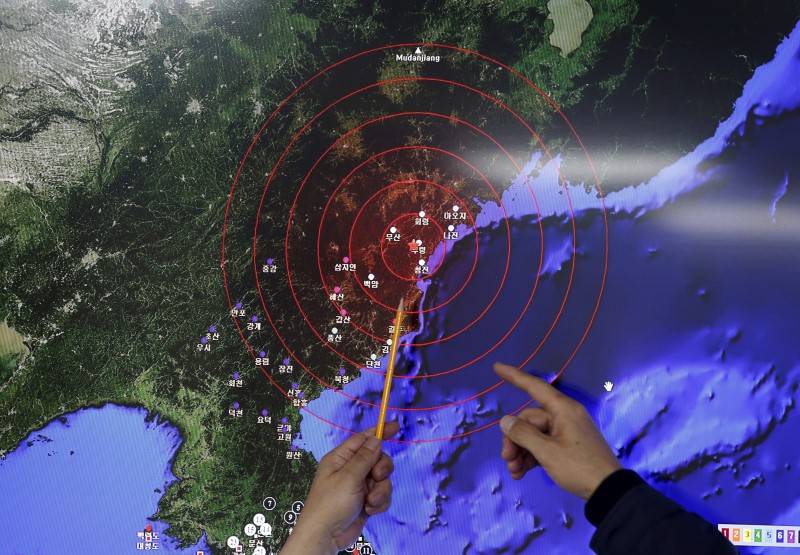
Ko Yun-hwa (L), Administrator of Korea Meteorological Administration, points at where seismic waves observed in South Korea came from, during a media briefing at Korea Meteorological Administration in Seoul, South Korea, January 6, 2016. REUTERS/Kim Hong-Ji
Reuters- South Korea is in talks with the United States to deploy U.S. strategic assets on the Korean peninsula, day after North Korea said it successfully tested a hydrogen nuclear device.
The United States and weapons experts voiced doubts the device was as advanced as North Korea claimed, but calls mounted for more sanctions against the isolated state for its rogue nuclear program.
The underground explosion angered China, which was not given prior notice although it is North Korea’s main ally, pointing to a strain in ties between the neighbors. The test also alarmed Japan and the White House said Prime Minister Shinzo Abe agreed with U.S. President Barack Obama in a telephone call that a firm global response was needed.
Obama also spoke to President Park Geun-hye of South Korea to discuss options.
A South Korean military official told Reuters the two countries had discussed the deployment of U.S. strategic assets on the divided Korean peninsula, but declined to give further details.
After North Korea last tested a nuclear device, in 2013, Washington sent a pair of nuclear-capable B-2 stealth bombers on a sortie over South Korea in a show of force. At the time, North Korea responded by threatening a nuclear strike on the United States.
South Korea, technically in a state of war against the North, said it was not considering a nuclear deterrent of its own, despite calls from ruling party leaders. The United States is highly unlikely to restore the tactical nuclear missiles it removed from South Korea in 1991, experts said.
The test was a “grave violation” of an August agreement by the two Koreas to ease tension and improve ties, a South Korean national security official, Cho Tae-yong, said in a statement.
“Our military is at a state of full readiness, and if North Korea wages provocation, there will be firm punishment.”
The South raised its military alert to the highest level in areas along the border near its propaganda loudspeakers, the South’s Yonhap news agency reported late on Thursday.
The United States is limited in its military response for fear of provoking an unpredictable regime in Pyongyang, said Anthony Cordesman, a defence policy expert at the Washington-based Center for Strategic and International Studies think-tank.
“Any escalation in this region, any over-reaction can easily lead to not only a conflict between South and North Korea, but drag China and the United States and Japan into a confrontation,” Cordesman said.
A Chinese foreign ministry spokeswoman called for a resumption of so-called six-party talks between the two Koreas, China, the United States, Japan and Russia aimed at curbing North Korea’s nuclear ambitions.
“We are worried about how things are developing,” the spokeswoman, HuaChunying, told a briefing.
Asked about a suggestion from U.S. Republican presidential front-runner Donald Trump that China could do more to rein in North Korea, Hua said: “What constructive efforts have they made?”
Hours after the nuclear test, the U.N. Security Council said it would work immediately on significant new measures against North Korea. Diplomats said that could mean an expansion of sanctions, although major powers might baulk at an all-out economic offensive.
